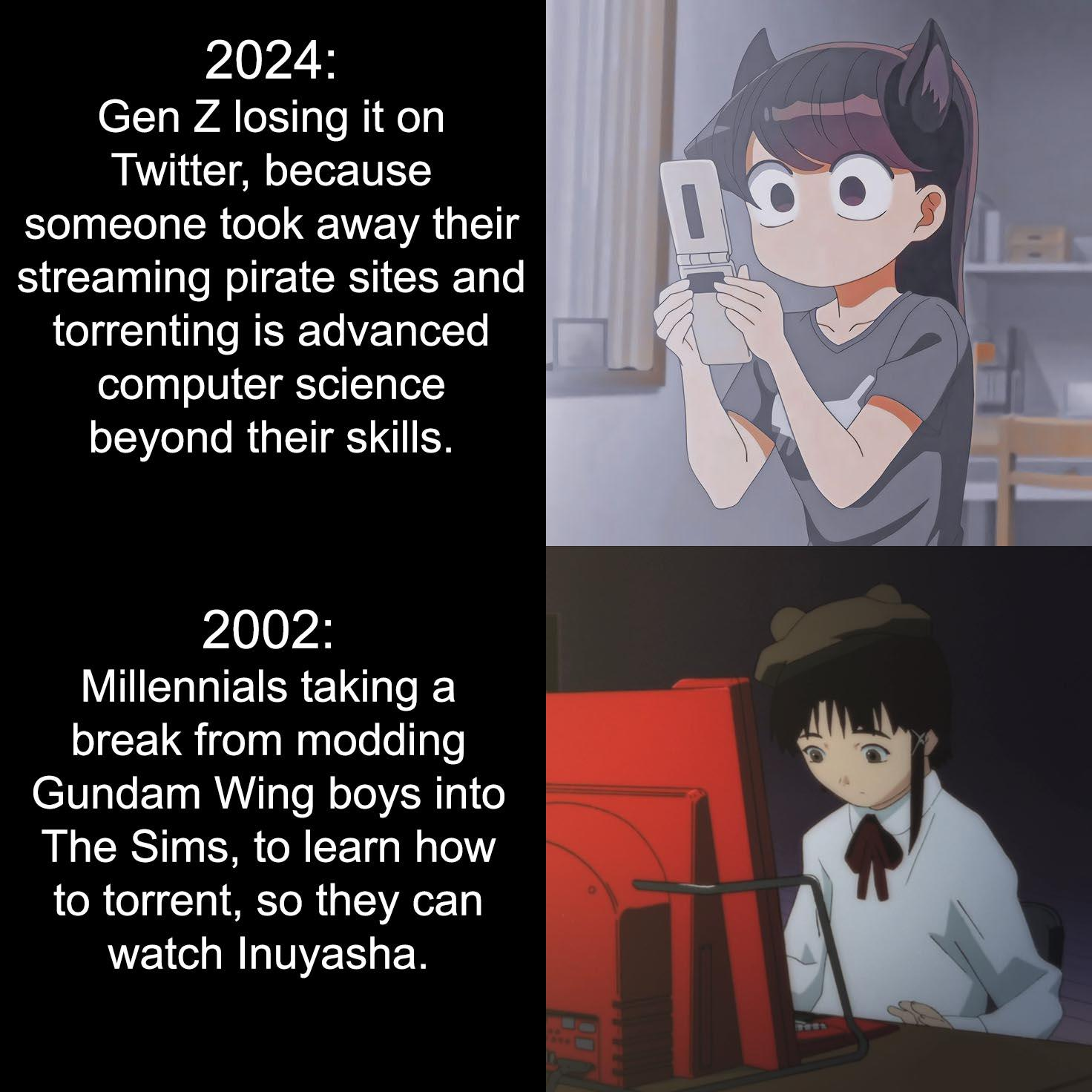this post was submitted on 18 Oct 2024
752 points (94.8% liked)
Piracy: ꜱᴀɪʟ ᴛʜᴇ ʜɪɢʜ ꜱᴇᴀꜱ
54772 readers
399 users here now
⚓ Dedicated to the discussion of digital piracy, including ethical problems and legal advancements.
Rules • Full Version
1. Posts must be related to the discussion of digital piracy
2. Don't request invites, trade, sell, or self-promote
3. Don't request or link to specific pirated titles, including DMs
4. Don't submit low-quality posts, be entitled, or harass others
Loot, Pillage, & Plunder
📜 c/Piracy Wiki (Community Edition):
💰 Please help cover server costs.
 |
 |
|---|---|
| Ko-fi | Liberapay |
founded 1 year ago
MODERATORS
you are viewing a single comment's thread
view the rest of the comments
view the rest of the comments


I think it's more a generational gap in basic computer skills.
Millennials grew up alongside modern computing (meaning the two matured together). We dealt with everything from BASIC on a C64 to DOS and then through Windows 3 through current. We also grew up alongside Linux. We understand computers (mostly) and the (various) paradigms they use.
Gen Z is what I refer to as the iPad generation (give or take a few years). Everything's dumbed down and they never had to learn what a folder is or why you should organize documents into them instead of throwing them all in "Documents" library and just using search. (i.e. throw everything in a junk drawer and rummage through it as needed).
As with millennials who can't balance a checkbook or do basic household tasks, I don't blame Gen Z for not learning; I blame those who didn't teach them. In this case, tech companies who keep dumbing everything down.
Edit: "Balance a checkbook" doesn't have to mean a physical transaction log for old school checks. It just means keeping track of expenditures and deposits so that you know the money in your account is sufficient to cover your purchases. You'd be surprised how many people my age can't manage that.
I don't know how many time I answered the same thing to the exact same argument but here goes:
In short, it's most likely not true. You're implying the the millennials were generally more competent but it's very likely wrong, the vast majority of people in that gen had absolutely no clue what they were doing on a computer most of the time they just knew how to do a few limited things with them.
The apps didn't make the masses tech illiterate, the app adjusted to the existing ones and removed the stuff they couldn't never understand, like where to save a file to be able to find it later. (I've worked in a support call center and I can tell you with 98.5% accuracy that the lost file is in system32).
The gen-z has quite a lot of smart, curious tech savvy people, and a vast majority of tech-illiterate people, so did the millenial, and the X, and the boomers.
This whole generational superiority argument is just as baseless as it was when my gen was blaming yours for being lazy, not able to learn anything due to a short attention span and an obsession for brunch and avocado toast.
I actually hire engineers and I do notice that the zoomers seem to have less general computing and IT skills, though I think some of that has to do with how the curriculum has changed. Software engineering and CS is just way more specialized than it used to be and isn't just a slow evolution from computer engineering these days. So you don't get that broad computing background which starts with electrodynamics and works up through digital design, comms, networking, and ultimately software.
For my purposes, this knowledge is a big part of what differentiates a developer from an engineer (and proper computer science is a different thing entirely) which has made it really difficult to figure out what to expect from a software engineering degree.
Oh don't get me started on modern "CS" curriculum of some schools, it's atrocious. I see them start learning about react and nodejs in year 1 because "that's what companies need" but that leaves them with massive fundamental knowledge gaps. I've seen people 5 years in their degree who struggled with Boolean logic.
I believe they should start at the bottom of the stack and climb up instead of starting somewhere at the top and being left oblivious about the massive amount of stuff going on below. And the "internship" system we have in my country is massive BS. Basically instead of learning they spend 1/2 of their education time doing menial job in companies. Which means their 5 years degrees is barely 2.5 of actual school time but we still like to pretend it's equivalent to a normal masters degree.
The "need of the industry" for "IT people" has lead to the proliferation of diploma mill curriculum that churn out monkeys lightly trained on the proverbial typewriter and calls them "software engineers".
But we still have excellent schools that produce very well trained people, and I do not believe they produce less of them, it's just that we also produce a lot more that went through bad curriculums.